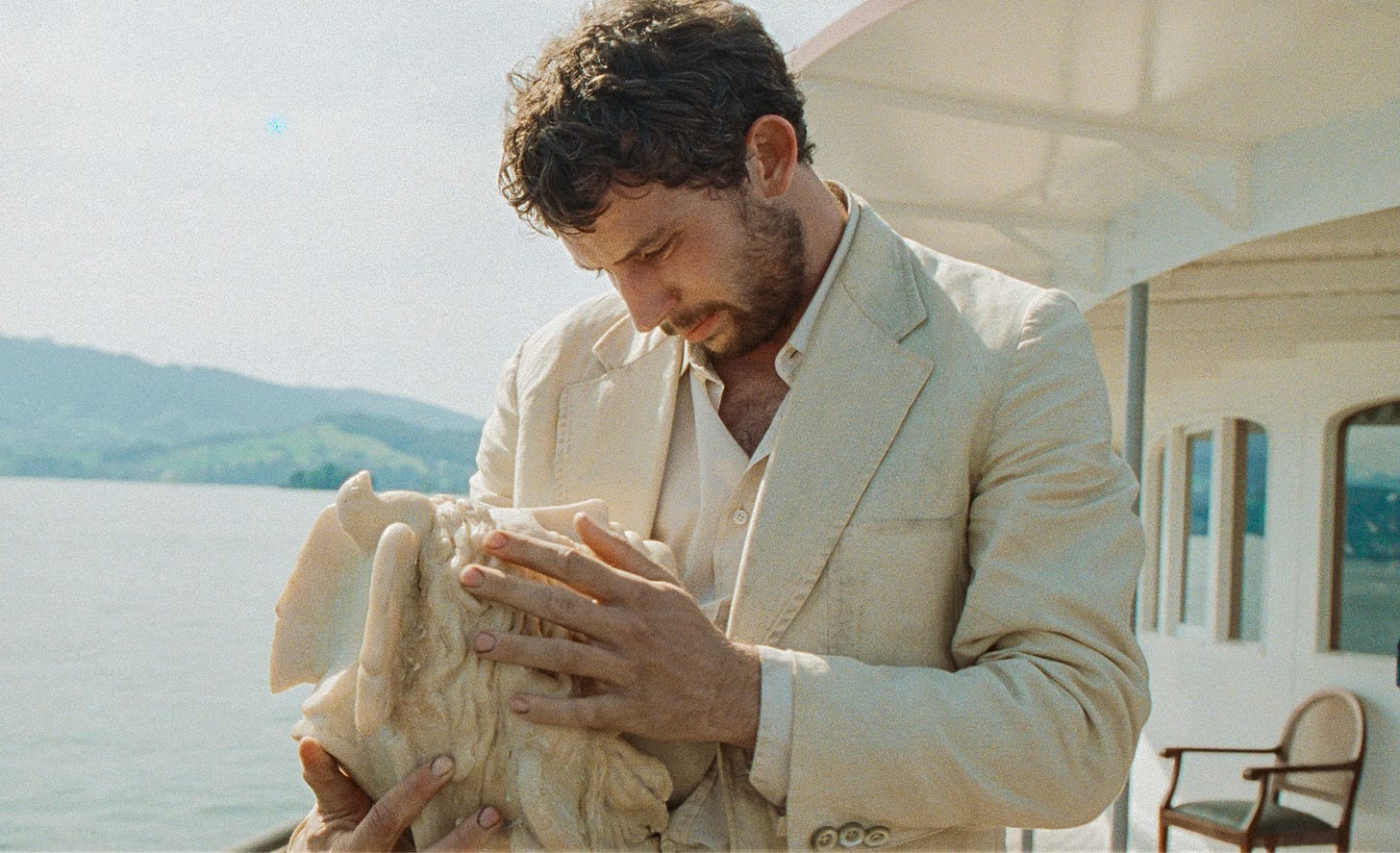La Chimera
Not made for human eyes
Arthur (Josh O’Connor) is sleeping on the train. He’s dreaming in 16mm. He sees a pretty girl who smiles at him and tells him she suspects the sun is following them. Arthur wakes up. The conductor is asking him for his ticket. He presents a letter of curious origin, but it satisfies the conductor. A peddler selling contraband irritates him, and Arthur aggressively chases him off, scaring some of the other passengers in the process. There is something deeply uncaring in his demeanor. He seems like a man with nothing to lose.
Set in 1980s Italy, La Chimera (2024) tells the story of a disgraced archaeologist searching for… what exactly? It’s a question I’ve been thinking about since seeing the film. There’s so much I don’t want to say regarding the movie's plotting because one of the sublime joys of watching it is its complete unpredictability. Like standing nose-distance from a painting and slowly backing up, images that don’t seem to make sense slowly shift into a surprising but understandable whole.
Film buffs will see Fellini all over La Chimera. An early scene depicting a villa bonfire throws back to Amarcord (1973), while priceless, possibly sacred, art is suspended by machinery a la La Dolce Vita (1960). Scenes depicting Italian family life play out like Noah Baumbach meets Hayao Miyazaki: everyone talking at once, scrabbling for the moral high ground. La Chimera is that perfectly fresh film that, from a creative standpoint, honors the past while forging a new path into the future. You can easily imagine someone watching this and it becoming their favorite movie. As I watched, I just started a list of the creative choices that caught me off guard (I will only list a few so as not to ruin the surprise):
Breaking the 4th wall: ONCE
Mid-film musical montage story recap. (Think: Fantastic Mr. Fox (2009))
Camera tricks that harken back to pre-sound film
The titular “chimeras” of the story are visions that Arthur has that lead him to Etruscan tombs scattered all about Italy. Arthur is haunted by lovely dreams of Beniamina (Yle Vianello) as he stays at her mother's house, Flora (Isabella Rossellini). He’s waited on by Italia (Carol Duarte), a warm but weary figure who serves him bland food and cold coffee in the house where he stays with Beniamina’s mother. Her demeanor suggests she might have a soft spot for Arthur, though it’s never clear if it’s romance or pity. Their few exchanges—marked by glances that could mean everything or nothing—have us rooting for them. The odds, though, don’t seem great. His days pass, reunited with his gang, his tombaroli, as they find and rob graves, using Arthur’s gift, to sell the artifacts to a black market dealer. Arthur doesn’t seem to give much thought to these robberies, even when someone he has feelings for discovers him on the job and loses respect for him.
Arthur moves like a distracted ghost through the world, only occasionally being reminded of his humanity when he slumbers. The past and the future hold no meaning for him. Do you know who else doesn't derive meaning from the past or the future? Birds!
Birds feature prominently in the film: the (well captured and mixed) sounds of parrots in the villa, images of ocean flocks flying in 16mm, a giant macaw in captivity, loons, larks, pigeons, owls, and more that I’m sure will be evident with another viewing. It is one of the rare creative delights of this film that it’s so pure in its use of visual metaphor. Like seeing a student art project and thinking, “Damn, it seems so simple.” But recognizing the seeming impossibility of embracing simplicity. The aforementioned, creatively riveting, mid-film musical montage features a few lyrics that some might consider on the nose: “If man were more like birds, we’d worry less and live more freely.” This may be true, and we may be meant to see the similarities between Arthur and avifauna, but I believe director Alice Rohrwacherit, after giving us many seemingly on-the-nose images to digest, is playfully giving us something new: a contradiction. How life-like. Birds may be admirably free, but it is only when Arthur is stumbling towards his humanity that he is most at peace.
La Chimera
Written and Directed by Alice Rohrwacher
2024
131 minutes
Italian, English
Recommended way to watch (at time of publication): Hulu
You’ll like this if you like: Nights of Cabiria (1957), La Dolce Vita (1960), Volver (2006)


This is a lovely film.